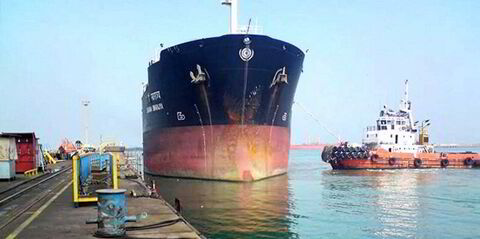Among the flurry of announcements at the COP26 climate conference was the formation of a body to set sustainability reporting standards for investors.
And buried in the hundreds of pages of industry-specific standards to be considered by the new International Sustainability Standards Board (ISSB) are a set of proposed rules for how shipping is expected to disclose its climate impacts to investors. (They are on page 562 of a supplement, to be exact.)
Amid the calls for shipping to take a more ambitious approach to decarbonisation, the industry-specific rules put forward are built on the existing disclosure requirements of the Sustainability Accounting Standards Board (SASB).
But efforts are underway to revise them.
The ISSB has not been seated yet, and until it takes shape, the Value Reporting Foundation will continue to run the SASB standards on its own.
"We continue right now, in the interim, to operate with our SASB Standards Board and continue to revise and improve the standards," said Lynn Xia, head of research for SASB standards at the foundation.
The IFRS Foundation — the non-profit group behind the International Financial Reporting Standards used in global accounting — launched the ISSB as a way to set baseline standards for companies' disclosures to investors on sustainability practices.
As part of that effort, the IFRS-led Technical Readiness Working Group is seeking to lay the groundwork for the ISSB's coming disclosure rules.
Last month, the group put forward to the new board prototype standards for climate-related disclosures, alongside a 581-page supplement with industry-specific rules.

The shipping-related standards lay out metrics for the industry's direct emissions, as measured in tonnes of CO2 equivalent, and call for companies to provide investors with details of their plans to address those emissions.
The standards include disclosures of measures under the International Maritime Organization's Energy Efficiency Design Index, without yet addressing the IMO's planned energy-efficiency and carbon-efficiency rules slated for 2023.
ISSB: The International Sustainability Standards Board will bring together standards for investor disclosures on sustainability matters.
IFRS Foundation: The non-profit organisation behind the International Financial Reporting Standards and the ISSB.
SASB: The Sustainability Accounting Standards Board sets accounting rules for environment, corporate and governance matters. It is backed by the Value Reporting Foundation, which will be consolidated with the Climate Disclosure Standards Board.
The SASB codified its standards in 2018, amid growing interest from investors on environmental, social and governance (ESG) matters.
It quickly pivoted the next year to dialogue with the investment community about how to improve the standards, and marine transport has been a key focus area when it comes to greenhouse gas disclosures.
Changes being explored include adapting to looming regulations, as well as ways to better align emissions metrics with industry practices. The goal is to improve "decision usefulness" of the disclosures, according to Xia.
"The focus really is around looking at these climate issues, which definitely are a foremost priority overall for the ESG disclosure space right now," she said.
The SASB standards currently focus on scope 1 emissions, the pollution from a company's main activities. But Xia said the SASB is interested in looking at scope 2 emissions — those created in the production of the energy acquired by a company — and more indirect scope 3 emissions.
She emphasised that in developing standards, SASB puts a high value on market input, so it aims to stay up to date with emerging regulations, such as IMO rules.
"But equally ... we have to see what ultimately is the decision-useful information for investors," she said.



